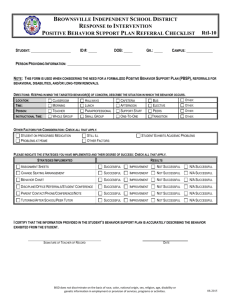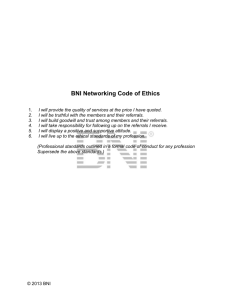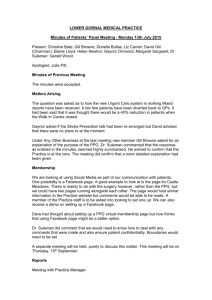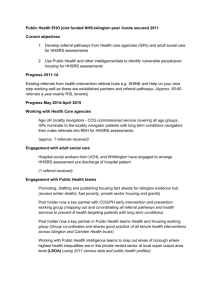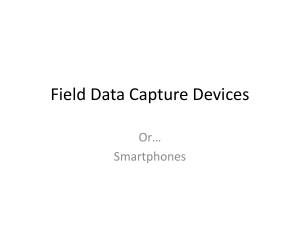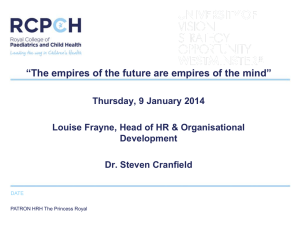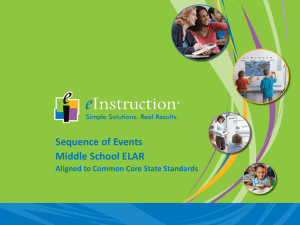draft IAPTS Communication Plan
advertisement
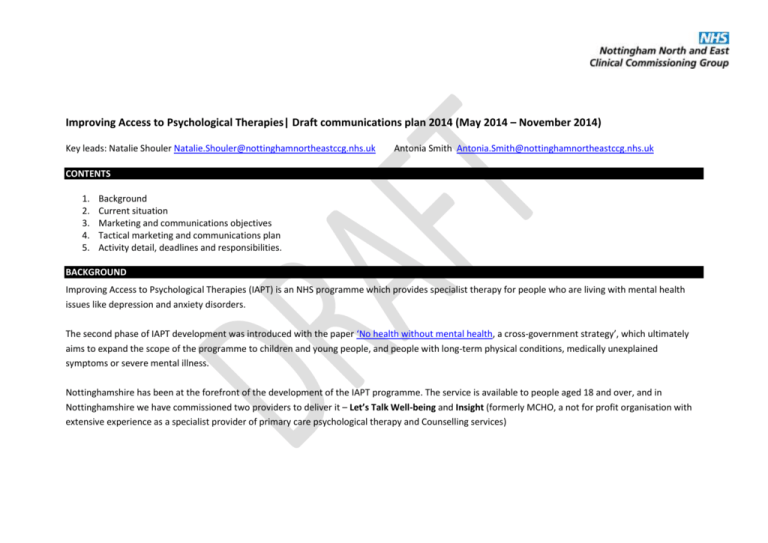
Improving Access to Psychological Therapies| Draft communications plan 2014 (May 2014 – November 2014) Key leads: Natalie Shouler Natalie.Shouler@nottinghamnortheastccg.nhs.uk Antonia Smith Antonia.Smith@nottinghamnortheastccg.nhs.uk CONTENTS 1. 2. 3. 4. 5. Background Current situation Marketing and communications objectives Tactical marketing and communications plan Activity detail, deadlines and responsibilities. BACKGROUND Improving Access to Psychological Therapies (IAPT) is an NHS programme which provides specialist therapy for people who are living with mental health issues like depression and anxiety disorders. The second phase of IAPT development was introduced with the paper ‘No health without mental health, a cross-government strategy’, which ultimately aims to expand the scope of the programme to children and young people, and people with long-term physical conditions, medically unexplained symptoms or severe mental illness. Nottinghamshire has been at the forefront of the development of the IAPT programme. The service is available to people aged 18 and over, and in Nottinghamshire we have commissioned two providers to deliver it – Let’s Talk Well-being and Insight (formerly MCHO, a not for profit organisation with extensive experience as a specialist provider of primary care psychological therapy and Counselling services) Users, or prospective users, of the service can access it by referral from their GP, or they can self-refer via the providers’ website or by calling their provider of choice directly. The first stage is an assessment appointment, which can take place over the phone or face-to-face. Following that, depending on need, therapy will be provided over the phone, face-to-face or in groups. Let’s Talk Well-being is a long-standing provider of the IAPT programme so experiences a higher volume of referrals than Insight. The target set by Government is that at least 15 per cent of a CCG area’s prevalent population must be assessed and start a treatment. NNE CCG is much lower than this, and GP referrals are lower than average for the area. CURRENT SITUATION Currently, the top five performing practices in terms of referrals over the last year are: Daybrook, Newthorpe, Unity, Jubilee and Ivy. However, there is no consistent trend of activity, with even the strongest performers overall having months with very low referral levels at some times in the year. As a CCG, we are well below the 15 per cent target of the prevalent population. The Primary Care Team are still developing strategies to increase access and there is certainly a strong case for getting GP opinions and investigating why they choose not to refer (and in some cases prefer to prescribe). However, one of the ways we might redress the balance is by developing some communications activities to promote the benefits of the service. The Let’s Talk service has been established in Nottinghamshire for a while and, as such, receives the majority of referrals to services. This means that there is more pressure on referral times. Insight implemented their own communications activities, which include the production and distribution of a leaflet explaining the new service, a newly branded website and have met with clinicians in practice to discuss what they do. However, they are struggling to increase referrals. The target of 15 per cent is one that we, as a CCG, must achieve. Our challenge is to use our influence to raise awareness of the service to GPs and to the patient population. We have a established a dedicated working group to develop and implement the plan. We have planned in monthly update meetings, with representation from Commissioning and Primary Care Team, Lead Commissioner for IAPT, communications and engagement leads. MARKETING AND COMMUNICATIONS OBJECTIVES Communications aims Develop a targeted, but consistent communication plan to raise awareness amongst selected segments of the public, provide more choice and improve the mental health of our patient population. Raise the profile of our IAPT local providers internally to ensure GPs know what services are available and see the benefits of referring to the service Utilise case studies and tell stories to help promote the benefits to practitioners and patients Objectives 1. 2. 3. 4. 5. 6. To identify GP practices with low referrals and support and target them with sustained communications Through a web-based survey, we will try to understand GP motivations for using/ not using the service. To increase the numbers of self-referrals by promoting the service to the local communities covered by NNE CCG To emphasis the benefits of referral to the services through stories (patient experience) and statistics showing impact To increase the number of referrals to Insight from all GPs through sustained communications To increase the numbers of self-referrals through on-going communications targeting of specific groups Audience 1. Local GPs 2. Patients, particularly those which might see a high prevalence of mental health issues – older people, the unemployed, people with LTCs, people leaving hospital, people living in deprived areas Care homes Sheltered accommodation Out patients Social housing tenants Self help groups for people with MH issues or those living with long-term conditions Job centre, Futures targeting geographical areas with high levels of deprivation Key messages IAPTS/ Nottinghamshire Talking Therapies GPs They are a cost-effective response to Mental Health issues by reducing inappropriate referrals to secondary care They are proven to have a positive impact on the health and well-being of patients – can use stats and case studies There is a choice of IAPT providers in Nottinghamshire. The new provider on the scene, Insight, is a professional service with proven results and can ensure a swift response time. We are making a commitment to increase referrals because we know it benefits users The socio-economic climate means that there are even more people who could benefit from psychological therapies to improve their health and well-being rather than resort to prescribing drugs. They are particularly effective with certain groups and enable people to take control of their condition Patients It’s good to talk – stress the benefits of the service They can help take control of your condition and overcome your fears and isolation There are two providers of the service and there is capacity for you to be seen quickly You can access the service yourself without even going through your GP (call to action as to how) The therapists/ advisers have wealth of experience and expertise in supporting people to overcome and manage a wide range of mental health issues. Communications must Prove the effectiveness of the treatment by demonstrating the benefits Overcome the stigma around mental health Tell positive stories of how the service has impacted on people’s lives Tone of voice Language should be tailored according to audience i.e. recognise the differences between those in the medical sector and members of the public Be patient-focused, approachable and knowledgeable OVERARCHING TACTICAL MARKETING COMMUNICATIONS PLAN Marketing mix Target audience Activities Measureable outcomes Personal selling (including collateral/displays) All GPs PLT time presentation Presentation at Clinical Cabinet Arranging meetings at Practices who have the Impact of activity in terms of increase in referrals from targeted organisations. Traffic to website lowest referral rates Insight leaflet - distributed to key points including care homes, CABs, LAs, outpatient etc and promoting self referrals Event collateral FAQ sheet Posters and leaflets targeted at specific groups, eg LTCs, older people, unemployed Digital (web development, other electronic activities) All Regular case studies promoted on NNE CCG website Twitter promo with new stories and case studies as and when New Mental Health bulletin for GPs and partners Increased web traffic Twitter stats Newsletter opening stats Direct marketing (e-DM and DM) Summary events plan All Ensure partner contacts are effectively kept up to date with relevant developments and information via Practice News and new Mental Health bulletin Use case studies etc create a series of profile raising communications, utilising digital routes and driving traffic to the website – this can be done via twitter feed linked to website Public Identify list of relevant community health events and services Display stand at key community health events Link in with Nottingham’s Mental Health Commercial PR and media All Drive enquiries from key segments of prospective client base Increased web traffic Social media stats Newsletter opening stats Referrals from events Traffic to website Increased self referrals Awareness Weeks organisers and use event as platform to promote the service – perhaps even put on a workshop? Create a targeted media relations plan Identify Insight Champions and offer them to media as MH experts Identify case studies of positive patient experiences Utilise partner newsletters to promote the service – eg Gedling Contacts Magazine Coverage frequency and column inches in relevant media ACTIVITY DETAIL, RESPONSIBILITIES AND TIMESCALES Activity in green will be actioned now! Activity Utilise Tuesday 6 May bulletin to get a ‘current picture’ and a referral reminder story out to practices. Target Group (s) GPs Survey to get information about why and why not GPS are referring to talking therapies. GPs Key dates May 6 2014 Who? Natalie and Antonia Progress DONE – W/C 6/5/2014 Survey circulated end May Deadline for responses 13 June Feedback discussed at Clinical Cabinet Natalie and Antonia, with support from Michael Ellis Survey created 12/5/2014 Sent to IAPTs project team For approval 13/5/2014 Presentation about the available services, benefits and referral details at the Clinical Cabinet GPs Clinical Cabinet – 17 June Marie Crowley Primary Care Mental Health Implementation Manager Target the very low referring practices with face-to-face interventions – visits from Primary Care Team. GPs – lowest referring practices End June 2013 Natalie Develop an FAQ fact sheet for Primary Care Team to give at GP visits GPs and patients May 2013 Develop Mental Health bulletin in Mail Chimp to highlight patient stories and key GPs First edition scheduled as Insight Marie Crowley Primary Care Team Comms Communications In progress Activity data Target Group (s) Key dates follow up to Clinical Cabinet – early July 2014 Who? Customise GP Mental Health enewsletter to target partners. Partners – Borough Councils, Local Businesses, Notts County Council, Vol and community sector, CAB, Nottingham Futures, Job Centre July 2014 Antonia Develop fact sheet for patients to promote on CCG and provider websites Patient – general June 2013 Marie, Natalie, Antonia Liaise with Insight to support them to communicate key messages to targeted sections of the community. Care homes Sheltered accommodation Mental health-related SHG Out patients Social housing tenants People living with long-term conditions New mums May and June 2013 Insight team Natalie Antonia Identify case studies from both providers, but particularly Insight and tell stories which highlight the benefits of the service (patient experience) and disseminate these via our communications channels All patient groups May Insight to provide case studies Marie Crowley to liaise with the provider CCG Comms to use comms channels to promote Work with specific target groups to Targeted patient groups By end of Engagement and Comms Progress Activity design communications to suit them, this might be facebook promo for young unemployed, or poster campaign for older people. Target Group (s) Key dates September Who? Utilise LA communications to reach more people. Gedling, Ashfield and N&S residents Ongoing Antonia Plan a promotion to coincide with Notts MHW – Insight to perhaps run a workshop Patients suffering with mental health issues Sept/ Oct 2014 Comms Input from all Ongoing media relations Regular releases.. Identify Insight Champions and offer them to media as MH experts Identify case studies of positive patient experiences Utilise partner newsletters to promote the service – eg Gedling Contacts Magazine All On going from May 2014 Antonia, Insight and Luke Barrett (GEM communications) Evaluate the activity as detailed in the overarching plan N/A September 2014 Natalie, Antonia, Marie Progress
